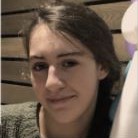Alessandra Pappalardi
Alessandra Pappalardi - Class of 2023

Summer of 2020
Alessandra Pappalardi’s idea to research popularity was sparked by the teen-targeted movies she and her friends watched, such as Clueless and Mean Girls. “Why do they always portray popularity as the be-all, end-all goal?” she wondered.
To explore the topic, she disseminated a questionnaire online that drew nearly 600 responses. The 25-question survey asked respondents if they felt they were popular, if it was important to them and more. They answered each on a scale from 1 to 5.
“I found that when I asked them how they view the concept of popularity, a majority of responses were positive,” she said. “When I correlated with how influential the media is with their view of popularity, that turned out to be significant.”
Those who agreed that movies and media have a strong influence on people’s lives were more likely to associate popularity with values such as kindness and intelligence.
A sophomore now, Pappalardi plans to explore genetic kidney disease next year in the Science Research Program. She has found a mentor for the project, Dr. Cynthia Silva of the Connecticut Children’s Medical Center. The project she did this year grew out of a curiosity about what she saw all around her.
“It’s interesting how influential things that we see on TV can be, and how they can change the things that we see in ourselves,” she said.
Summer of 2021
Viewers of medical dramas on television watch discussions about numerous rare or fatal diseases, as well as many common or less infamous ones.
Alessandra Pappalardi, a participant in New Rochelle High School’s Science Research Program, wanted to use her project to research one of these less-well-known diseases. She decided to focus on pediatric kidney issues.
“My family has a history of kidney issues, myself included,’ said Pappalardi. “Being a film and television geek at heart, I noticed these afflictions are hardly covered by the entertainment industry and are also scarcely represented on social media platforms and news outlets. The Science Research Program allowed me to combine my interests in both nephrology and the media.”
Pappalardi surveyed the general public’s comprehension of pediatric nephrology in addition to what people have learned about it through media including news programs, the entertainment industry and social media. She found that, despite the prevalence of kidney disease across multiple age groups and races, it doesn’t get much coverage.
“Upon questioning participants about their perceptions of the illness, I found a majority of participants believed the information they absorbed through news networks is unreliable,” said Pappalardi. “They also doubted that the film industry’s inaccurate portrayals of youths suffering from illnesses could benefit recovering patients in any way. Overall, participants believed that different types of media glamorize the serious nature of diseases for the sake of entertainment and profit.”
Pappalardi’s experience in the Science Research Program has pushed her to contemplate her career path. She was pleased to have the opportunity to blend two major areas of interest. While she hasn’t yet fully determined where life after high school will take her, she believes research will be a part of it.
“The Science Research Program has already shaped my high school experience so much, and I hope that it will continue to do so,” she said.
